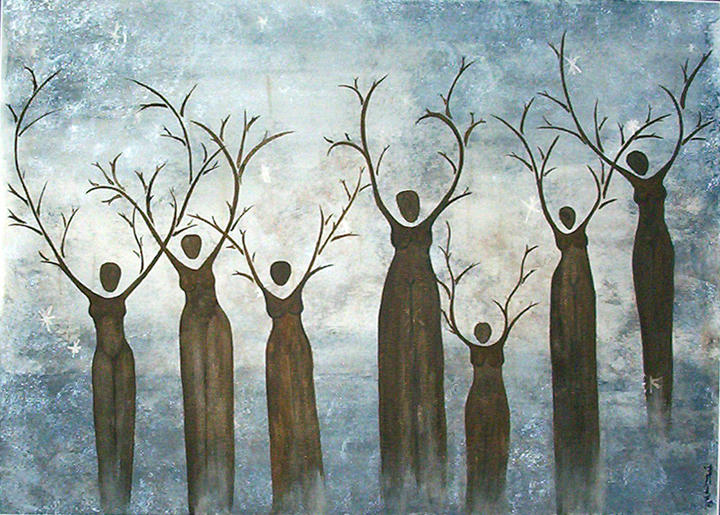Entwives en Hiver by kaiorton
I'm going to start off this first post on this topic with a simple axiomatic statement: Women and men are equally capable of being successful astronomers. There is no inherent difference in mental capacity, creativity, ability to learn, or any other factor that plays into the success of an astronomer.
Given this axiomatic starting point, it stands to reason that the fraction of women on the faculty at the top astronomy institutions should reflect the fraction of women earning PhDs. A quick glance through the "People" pages of the websites for Harvard, Princeton, Berkeley and Caltech astro departments (hereafter referred to as the "Big-4") shows that 31% of the graduate students (with gender-identifiable names) are women. Granted, there may be some errors on the various webpages, and I wasn't able to identify the gender of every student. But as a quick sanity check, I do have access to the student records over the past 10 years in Caltech astro. During this time (2001-2011) there have been 47 PhDs, 14 of them women, or 29.8%. So 30% is a pretty solid number for the fraction of women graduating with astronomy PhDs over the past decade (records going back to 1991 show about 27% over the past 20 years).
However, among the active (not retired), tenured or tenure-track faculty at these four institutions, only 12 out of 76 professors are women, or 15.7%. Thus, there is a factor of two decrease in the number of women between grad school and the tenure track. On the one hand, this is really good compared to physics. Take Caltech Physics as an example, where only 3 of the 49 faculty are women (6%). On the other hand if we stay focused just on astronomy, it is clear that there is a major leak in the pipeline.
Why should we care that the pipeline is leaky? Well, if women and men are equally capable of success and we are only drawing from the male side of the pool, then we are trading a non-negligible number of highly talented women for less-talented men. For any institution that prioritizes "excellence"---as all of the Big-4 claim they do---this is a major problem. This leak results in some number of junior faculty not getting tenure, while individuals who would have succeeded in those positions fall out of the hiring pool.


Comments
I’ve been following a lawsuit that will be heard and decided by the United States Supreme Court this term: Fisher v. The University of Texas. Fisher is a case that asks whether an admissions policy at the University of Texas that takes applicants’ race into account violates the Equal Protection clause of the Fourteenth Amendment. The case was filed by a white student, Abigail Fisher, who was denied admission to the University of Texas. She did not qualify for the University’s policy that allows any student in the top ten percent of her high school class to be admitted automatically (a “race-neutral” and sex-neutral policy). Instead, her application was put into competition with others who were not in their high schools’ top ten percent. She claims that minority students with less impressive academic credentials were admitted because their race was taken into account by the institution. The University had also adopted a policy that considered race as a non-determinative factor in admissions; its goal was to achieve diversity in the student body, a goal the institution believed would provide educational benefits. This policy, Fisher alleges, denied her an equal opportunity because of her race. The Supreme Court will decide whether her constitutional rights were violated, and quite possibly, the direction “affirmative action” will take for many years to come. The Court will hear argument in the case on October 10, and there is no timeline for its decision.
male students. Moss-Racussin et al. 2012 http://www.pnas.org/content/early/2012/09/14/1211286109.full.pdf). This implies that in order to be considered competent and hireable women have to work harder than men. There was an interesting post about transgender scientist that addresses these biases too (http://online.wsj.com/article/SB115274744775305134.html). Now, if you add the imposter syndrome: women astronomy graduate students are more likely than men to feel like imposters (Women and the Imposter Syndrome in Astronomy http://www.aas.org/cswa/status/STATUS_jan11_FINAL.pdf) and the fact that hiring committees are not diverse (mostly white males), it is not surprising the low number of women in faculty positions. STSci has a great talk given by Abby Stewart (ADVANCE/University of Michigan) on how to address unconscious bias here: https://webcast.stsci.edu/webcast/detail.xhtml;jsessionid=095D5C192BA672AD3978B7EE9C7C7784?talkid=2892&parent=1